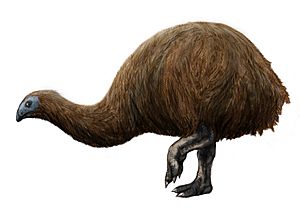Broad-billed moa facts for kids
Quick facts for kids Broad-billed moaTemporal range: Pleistocene-Holocene
|
|
|---|---|
 |
|
| Restoration | |
| Conservation status | |
| Scientific classification | |
| Genus: |
Euryapteryx
|
| Species: |
curtus
|
The broad-billed moa or coastal moa (Euryapteryx curtus) was a large, flightless bird that is now extinct. This means it no longer exists anywhere in the world. It used to live in New Zealand, specifically on the North and South Islands, and also on Stewart Island.
Contents
About the Broad-billed Moa
The coastal moa mostly lived in dry areas with lots of shrubs. It was found all over the North Island. Many of these birds lived in the middle of the island, in the volcanic plateau, and along the Wanganui-Taranaki Coast.
What They Looked Like
These birds were quite strong and had short legs. Male broad-billed moas were about 1 meter (3.3 feet) tall. Females were a bit taller, reaching about 1.3 meters (4.3 feet). Their size could vary a lot, with some being twice as big as others. They usually weighed around 20 kilograms (44 pounds).
What They Ate
Scientists believe that broad-billed moas mainly ate fruit, leaves, and large insects. Younger moa chicks probably ate mostly insects.
How They Communicated
It is thought that coastal moas had a small olfactory chamber (the part of the brain that helps with smell). Because of this, scientists believe they had excellent vocal abilities. This means they were probably very good at making different sounds to communicate with each other.
Images for kids
See also
 In Spanish: Moa costero para niños
In Spanish: Moa costero para niños


